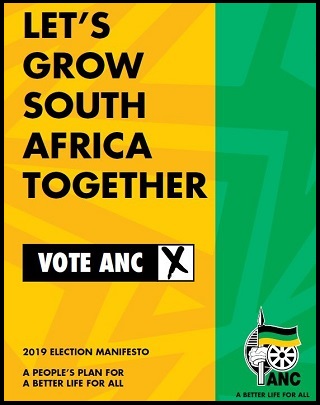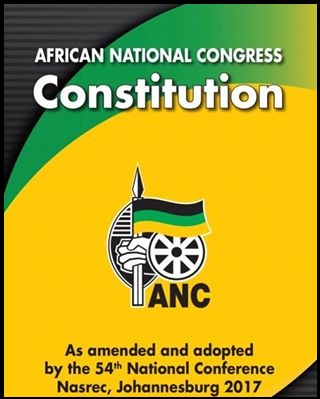Earlier this month the African National Congress (ANC) government hosted of the Second Summit of the Forum on China-Africa Cooperation (FOCAC) that the first time the summit is being held on the continent.
The ANC notes that deals worth R94 billion were signed between the ANC government and China at FOCAC last week. The leaders of the two countries also assessed progress achieved on a number of priority areas in the fields of infrastructure development, marine cooperation, and cooperation in special economic zone (SEZ’s) to name but a few.
The ANC government is co-chair of FOCAC for the period 2012-2018: and our hosting of this important and timely conference was testimony to the burgeoning trade, policy and political ties between South Africa and the People’s Republic of China.
The ANC reaffirms its strong fraternal ties with the Communist Party of China (CCP), a longstanding supporter of liberation movements in Africa, and of our own anti-apartheid struggle. The CCP gave its support variously to the ANC and the Pan-Africanist Congress (PAC).
As part of strengthening relations between the ANC and the PRC, then ANC President Cde. Oliver Tambo led delegations to China three times, first in 1963, then 1975 then 1983.
Cde. Tambo and the delegation held talks with Central Committee representatives as well as high-ranking government officials: who affirmed Chinese political and material support for the anti-apartheid struggle.
In 1961 a large number of the first Umkhonto we Sizwe (MK) cadres were sent for training in China; which was followed up with several ANC and SACP cadres.
Today China-South African trade continues to increase. This has been boosted by South Africa’s admission in 2010 to the BRICS group of emerging economies. BRICS has served as a key vehicle to further boost South-South cooperation, particularly with regards to the integration of our respective economies.
The trade and investment agreements signed at the summit was in terms of the Five-to-Ten Year Comprehensive Strategic Partnership for Cooperation that was signed by Presidents Jacob Zuma and Xi Jinping during Cde President Zuma’s visit to the PRC in September this year.
The aim of the agreement that was signed through the recently established Bi-National Commission and Inter-Ministerial Joint Working Group, is to enhance the partnership between the two countries by outlining specific areas of cooperation – with the view of advancing South Africa’s developmental agenda.
The ANC once again welcomes the progress on this strategic partnership: that has laid a solid socio-economic foundation for the advancement of a mutually beneficial partnership with the People’s Republic of China.
Chinese investment in South Africa is cumulatively valued at approximately 120 billion rand and with over 100 Chinese state-owned entities and multinational companies investing in South Africa.
Among the biggest beneficiaries of this favourable China-Africa investment climate is South Africa’s Oceans Economy, being rolled out through Operation Phakisa.
The ANC government has identified four priority sectors for oceans economy development, namely marine transport and manufacturing activities, offshore oil and gas exploration, aquaculture and marine protection services and ocean governance.
It is estimated that the oceans economy has the potential to contribute approximately R 177bn (USD 17bn) to the GDP and the creation of one million direct jobs by 2033, compared to the current contribution (by 2010) of R54bn to GDP and 316 000 jobs.
Chinese investment in our Oceans Economy is already underway, with the country’s National Development and Reform Commission designated the leading department to drive Blue Economy cooperation.
The ANC further notes that FOCAC took place at a time when not just South Africa but Africa as a whole continues to be a major beneficiary of Chinese overseas direct investment (ODI).
China’s National Development and Reform Commission is on a drive to promote cooperation between Chinese and African enterprises, and has introduced a series of investment funds to offer financial support to Chinese businesses wanting to cement strategic partnerships with African countries.
The China-Africa Development (CAD) Fund for instance is the first fund in China focusing on investment in Africa, and is specifically tailored to capacitate Chinese enterprises to invest in African countries, and promote the development of China African commercial ties.
According to the National Development and Reform Commission, the fund will ‘provide enterprises that invest in Africa with services like project and financial consultation, support for Chinese enterprises to identify potential investments, coordinate information sharing for investments in Africa, and provide enterprises to invest in Africa with management advice.”
Significantly, for our own South African companies, it will “help African projects look for Chinese partners.”
On a party political level, the ANC has signed a Memorandum of Understanding (MOU) with the CCP in the fields of political cooperation and exchange programmes.
Since 2008 the ANC has also conducted study tours to China as part of regular party-to-party exchanges.
Our cadres are being sent to interact with the Chinese government to gain insights into the ‘Chinese economic miracle’. This includes insights into the managing of state-owned enterprises, agricultural and land reform, industrialization, and public/private sector partnerships.
Amplifying the role of State-owned Enterprises (SOE’s) and Development Finance Institutions (DFI’s) as instruments for advancing economic transformation in South Africa is among the resolutions taken at the ANC’s 52nd and 53rd National Conferences respectively.
SOE’s and DFI’s ‘are drivers and agents of economic restructuring’ and play a formative role in advancing the objectives of a developmental state.
The broader aim of the developmental state, as the ANC notes in a 2012 policy discussion paper on SOE’s and DFI’s; “must be to restructure the economy in order to create decent job opportunities, improve the current disparities with respect to income distribution levels, enhance the quality of service delivery and address social justice concerns, in an all- encompassing manner.”
On a party-to-party level, we also have much to learn from the CCP’s party reform processes, especially on matters of party cohesion and rooting out corruption.
The ANC’s relations with the Chinese Communist Party (CCP) are not based on the sentimentality of history: but remain solidly grounded in our mutual commitment to advance South/South cooperation.
Like South Africa, the Chinese model is of a Developmental State that offers both an effective growth strategy and the realization of socio-economic transformation of the lives of the majority of its citizens.
China’s well-documented ‘economic miracle’ offers valuable lessons on the State’s role in the management of the economy, which is aligned with the ANC’s path of radical socio-economic transformation.
The dramatic economic reforms ushered in by the CCP under the leadership of Deng Xiaoping in the late 1970’s brought millions of citizens out of poverty, spurred rapid industrialization, led to an almost tenfold rise in GDP, and overall set China on a path that resulted in the country now being the second largest economy in the world.
South Africa too has witnessed spectacular transformation in the lives of the majority of our people since 1994. Today, thanks to the policies of the ANC government, over 16 million South Africans have been brought out of poverty through comprehensive anti-poverty initiatives and extensive social security net, from a number of 2.7 million people in 1994.
More than 3.1 million houses have been built. Millions of South Africans have access to extensive healthcare services (including life-saving anti-retroviral treatment (ARV) to 2.4 million people). More than 12,8 million (86.4%) households have access to piped water. By 2013 85.4% of households were connected to an electricity grid.
According to Statistics South Africa, the percentage of households with access to improved sanitation has ‘increased consistently’ from 62.3% in 2002 to 77.9% in 2013. According to Investec, the financial lives of average South Africans have steadily improved in real terms since 1994. According to Investec, the national income per capita has increased from R27 521 per person in 1993, to R38 734 in 2011.
As we work towards transforming South Africa towards A Better Life for All, the ANC, as the ruling party of South Africa, will continue to take lessons from countries who offer alternative models of development, such as the Chinese ‘mixed economy’ model.
It has always been the ANC’s position that the State must play a formative role in stimulating national development: and we are unapologetic in our quest to learn from other countries’ successes as we manage the challenge of rebuilding our country after centuries of skewed development.
Comrade Edna Molewa is the Chairperson of the ANC NEC Subcommittee on International Relations




